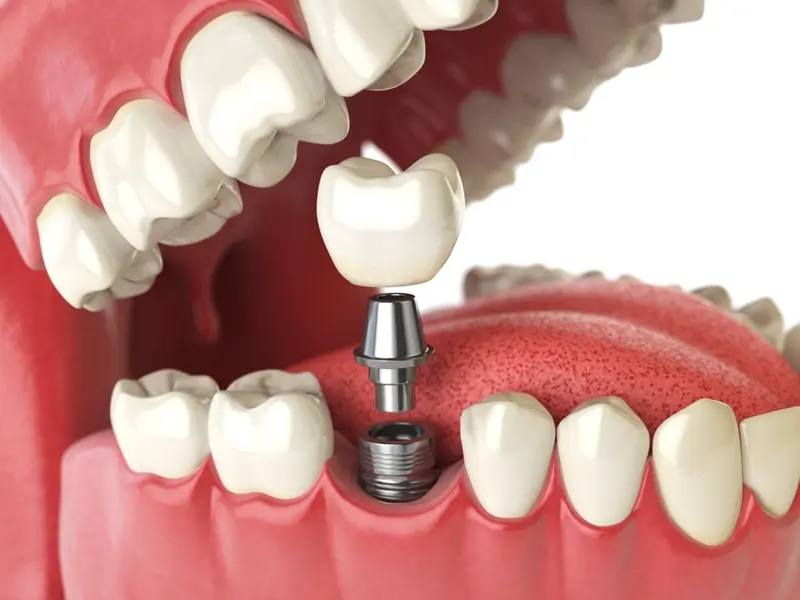Recovering from dental implant surgery can be straightforward with the right approach. By following your oral surgeon’s advice and these 10 tips, you can minimize discomfort and ensure a smooth recovery.
What to expect after surgery
Dental implant surgery is a routine procedure, but some discomfort is normal in the days that follow. You may experience minor bruising, gum swelling, and facial swelling. Recovery times vary for each patient. Most recover within a few days, but factors such as bone grafts—required when the jawbone needs reinforcement—can extend the healing process.
Despite the temporary discomfort, dental implants have an impressive success rate of 98%, according to WebMD. With proper care and hygiene, they can last for many years, possibly even a lifetime.

How to recover as quickly as possible
Here are 10 proven ways to speed up your recovery:
1. Stick to soft foods
Eat soft foods like yogurt, scrambled eggs, and mashed potatoes to avoid unnecessary jaw movement. Cool foods help soothe sensitive gums and reduce discomfort.
2. Avoid hot or spicy foods and drinks
Your gums will be especially sensitive after surgery. Avoid anything hot, spicy, or acidic to prevent irritation and pain.
3. Don’t use a straw
Perhaps surprisingly, a straw is the last thing you should be using if you have an oral wound. The suction could disrupt the wound and slow down recovery. Drink directly from a glass instead.
4. Stay Hydrated—Avoid Alcohol and Caffeine
Hydration is crucial for recovery, as it is with many forms of illness or health issues. Drink plenty of water, but avoid alcohol and caffeinated beverages, as they can dehydrate your body and hinder healing.
5. Quit smoking
Smoking can slow the healing process by depriving your body of the oxygen it needs to recover quickly. Aside assisting a speedy recovery, there are plenty of reasons why quitting smoking is a good idea anyway.
6. Limit strenuous activities
Skip exercise routines and focus on resting. Avoid talking excessively in the first few hours post-surgery, as it can strain your jaw – your jawbone won’t thank you for being a chatter box.
7. Keep the swelling down with ice packs
Apply ice packs to your face for 15-20 minutes at a time during the first 24 hours to minimize swelling and bruising. If you don’t have an ice pack, a bag of frozen vegetables wrapped in a towel works well.
If you can keep the swelling and bruising down to a minimum, you’ll look and feel brighter.
8. Take prescribed pain medication
Follow your oral surgeon’s instructions regarding pain medication to manage discomfort effectively. Avoid exceeding the recommended dosage.
9. Salt water rinses
After the first day, use a warm saltwater rinse several times a day to keep the area clean and reduce bacteria.
10. Practise good dental hygiene
Keep the wound clean by brushing the teeth around the implant so that food particles can’t get stuck and risk infection.
After any form of dental surgery, it’s important to follow the instructions given to you by your oral surgeon, as they will provide advice specific to your procedure.
Preparing for Dental Implant Surgery
Preparing for dental implant surgery is crucial to ensure a smooth and successful recovery. Before the procedure, your oral surgeon will provide you with specific instructions to follow. These may include:
Avoiding certain medications, such as blood thinners, for a specified period before surgery.
Stopping smoking and tobacco use at least two weeks before surgery.
Eating a nutritious diet rich in vitamins and minerals to promote healing.
Arranging for someone to drive you home after the procedure.
Preparing a recovery area at home with comfortable pillows, blankets, and entertainment.
It’s essential to follow these instructions carefully to minimize the risk of complications and ensure a speedy recovery. By taking these steps, you set the stage for a smoother dental implant process and a more comfortable recovery period.
Managing Pain and Discomfort
After dental implant surgery, it’s common to experience some pain and discomfort. Your dentist or oral surgeon may prescribe pain medication to help manage this. It’s essential to follow the instructions for taking the medication and not to exceed the recommended dosage.
In addition to pain medication, there are other ways to manage pain and discomfort, such as:
Applying an ice pack to the affected area to reduce swelling and pain.
Eating soft, cold foods and drinks to reduce discomfort.
Avoiding strenuous activities and taking regular breaks to rest.
Using a warm saltwater rinse to soothe the surgical site.
By following these tips, you can help manage pain and discomfort and promote a smooth recovery. Remember, managing pain effectively is a key part of the dental implant recovery process.
Nutrition and Hydration for Recovery
Proper nutrition and hydration are essential for the healing process after dental implant surgery. A balanced diet rich in vitamins and minerals can help promote healing and reduce the risk of complications.
Some tips for nutrition and hydration during the recovery period include:
Eating soft, nutritious foods such as yogurt, scrambled eggs, and mashed potatoes.
Avoiding hot, spicy, or acidic foods and drinks that can irritate the surgical site.
Drinking plenty of water and other hydrating fluids to help flush out toxins.
Avoiding caffeine and alcohol, which can dehydrate the body and interfere with the healing process.
By following these tips, you can help promote a speedy and successful recovery. Proper nutrition and hydration are vital components of the dental implant healing process.
Maintaining Good Oral Hygiene
Maintaining good oral hygiene is crucial during the recovery period after dental implant surgery. This includes:
Brushing your teeth gently with a soft-bristled toothbrush, avoiding the surgical site.
Flossing carefully to remove food particles and plaque.
Rinsing your mouth with warm saltwater or a prescribed mouthwash to promote healing and reduce the risk of infection.
Avoiding hard or crunchy foods that can irritate the surgical site.
By following these tips, you can help promote a smooth recovery and reduce the risk of complications. Good oral hygiene is essential to prevent infection and implant failure, ensuring a successful recovery.
Scheduling Follow-Up Appointments

Scheduling follow-up appointments with your dentist or oral surgeon is essential to ensure a successful recovery. These appointments will allow your dentist to:
Monitor the healing process and check for any signs of complications.
Remove any sutures or stitches.
Provide additional instructions and guidance on caring for your dental implants.
Check the fit and comfort of your dental implants.
By attending these follow-up appointments, you can help ensure a successful recovery and a long-lasting, healthy smile. Regular check-ups are a crucial part of the dental implant process, helping to prevent infection and implant failure.
Expert Dental Implant Care in Wellington
For expert dental implant care in Wellington, call City Dentists at 04 978 4964 or book an appointment online. Our experienced team is here to guide you through every step of the process and help you achieve a healthy, lasting smile.
